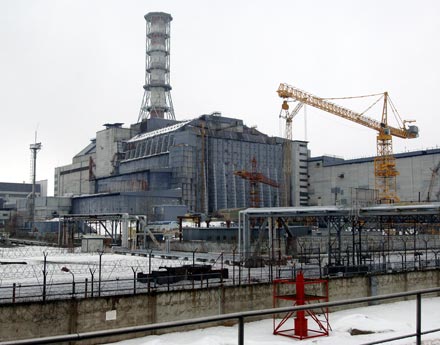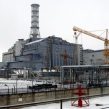
Ukraine Raises $790 Million For Chernobyl Shelter Project at Donor Conference
Publication: Eurasia Daily Monitor Volume: 8 Issue: 83
By:

International donors committed a total of some 550 million Euros ($790 million) for the Chernobyl Shelter Facility (CSF) fund at the donor conference in Kyiv on April 19. Although this is less than the Ukrainian government originally hoped to raise, it is still an achievement given that the global economy has not recovered from the financial crisis. The recent nuclear accident at the Japanese nuclear plant Fukushima 1 must have attracted more media attention to Chernobyl, consequently it was easier for Ukraine to attract additional donors. At the same time, this prevented Japan, one of the key donors, from contributing more to the CSF given that it now has a similar expensive problem to cope with.
The Ukrainian government hoped to raise the equivalent of $1.07 billion for the CSF fund at the conference. This, according to the Chernobyl zone administration, is needed in order to continue work to erect a new concrete structure to protect Chernobyl’s Number 4 reactor which was destroyed in the world’s worst nuclear accident 25 years ago, on April 26, 1986. Additionally, about $200 million from the fund should also be used to build a nuclear waste storage facility in Chernobyl. The total cost of the project is estimated at $2.3 billion (www.comments.ua, March 28). The arch-shaped 105-meters high and 150-meters long sarcophagus or shelter is being built by the French construction company, Novarka, while the New Jersey-based company, Holtec International, is working on the nuclear waste facility after winning a respective Ukrainian government tender in 2005.
Ukrainian President, Viktor Yanukovych, expressed gratitude to the donors in his speech to the conference. He estimated the sum collected at 550 million Euros and said the remainder should be raised shortly, making it possible to complete a new sarcophagus over reactor Number 4 by 2015 (Channel 5, April 20). The Ukrainian website, Kommentarii, reported on April 19, citing officials from the European Bank for Reconstruction and Development (EBRD) that the remaining sum would be collected within the next several months or even weeks.
Ukraine’s leadership addressed concerns that the money may be misappropriated given the notoriously high level of official corruption in the country. Yanukovych said the use of funds would be monitored by international organizations, primarily the EBRD (Interfax-Ukraine, April 20). Prime Minister, Mykola Azarov, assured the donors that spending money from the CSF fund in a transparent manner was “a matter of honor” for his government (Ukrainska Pravda, April 20).
The EBRD, which manages the CSF fund, was the first to declare its readiness to contribute to the fund ahead of the conference. EBRD Vice President, Horst Reichenbach, announced on March 29 in Kyiv that the EBRD was ready to contribute at least $173 million, and that it could provide up to 25 percent of the total if other donors agreed to commit more (RBK-Ukraine, March 29). European Commission President, Jose Manuel Barroso, who arrived in Kyiv one day before the donor conference, said that the commission’s contribution would amount to $158 million (UNIAN, April 18).
The bulk of the sum was contributed by the richest Western nations. The US was the main donor, committing $124 million to the CSF fund. Russia, which along with the US and France has commercial interests in Ukrainian nuclear power projects, promised to contribute $65 million, and France committed $68 million. Ukraine’s contribution to the fund amounted to $42 million. Canada, which gave money to Chernobyl projects in the past, abstained from contributing due to its upcoming election. Several Western nations such as Spain and the Republic of Ireland have been reluctant to contribute funds citing financial problems at home. Others, such as Denmark, argued that Ukraine should first abandon nuclear technology in power engineering (Kommersant-Ukraine, April 20). However, Kyiv made it clear that more reactors would be built at Ukraine’s nuclear plants during the next several years as the country continues to rely on nuclear energy which accounts for around 50 percent of domestic electricity generation
The CSF fund was set up as a result of a G7 initiative in 1997, since the concrete covering hastily erected over reactor Number 4 immediately after the disaster in the 1980’s started to crumble threatening to re-contaminate areas near Chernobyl including Kyiv. The EBRD was appointed to manage the fund. In 1999, the initial commitments of some $300 million were almost doubled, and more foreign governments promised to contribute at donor events in 2000 and 2005. The CSF project was originally estimated at $768 million. While the money was provided, the rising costs of materials and new safety standards pushed the prices up since the CSF fund was established, hence the need to collect more funds, the task which the April 19 conference largely accomplished.




